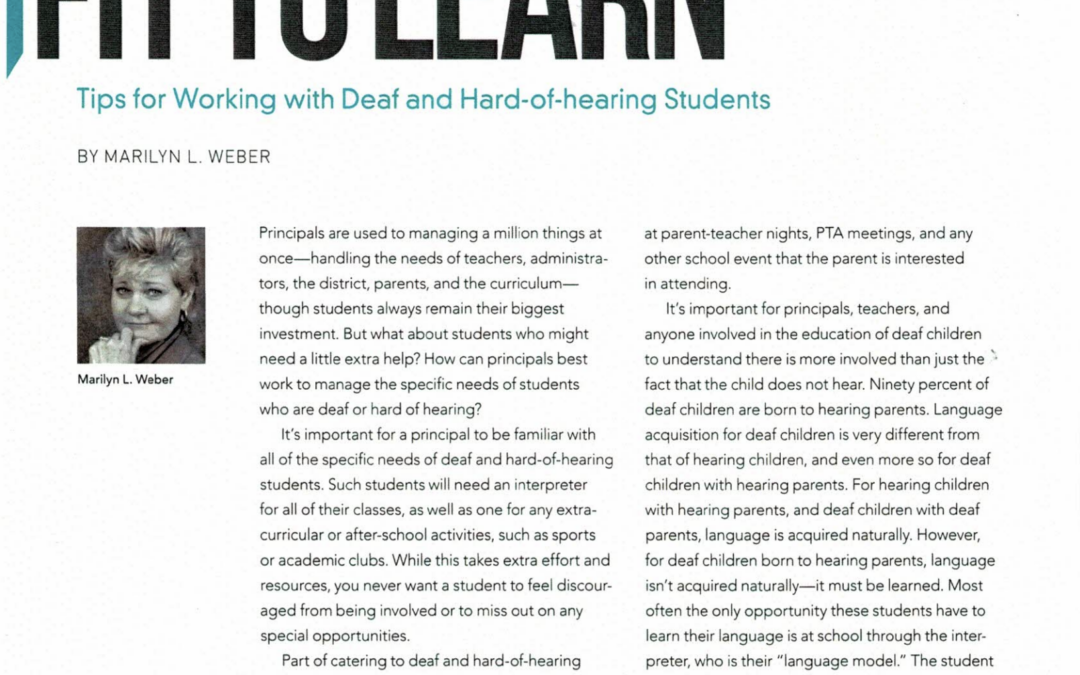By Mary Ann Azevedo
For Marilyn Weber, CEO of San Antonio-based Deaf Interpreter Services, the decision to enter this field was a highly personal one.
As the mother of a deaf child, Weber saw firsthand what she describes as the “tremendous need for, and serious lack of, professional interpreter services in the San Antonio area and beyond.” Weber became a certified Sign Language Interpreter while still working in the pharmacy of a hospital. She soon found herself being pulled from the pharmacy to interpret at the hospital.
In 1993, Weber decided to go full-force into interpreting. She began working at DIS when it launched in 1993 with just three part-time employees. By 1998, Weber had purchased the company and was aggressively purusing expansion. The business went national in 2001 and today has more than 65 employees in San Antonio alone.
Part of the company’s success, Weber believes, lies in its niche focus on medical, legal, business and education interpreting. DIS specializes in providing around-the-clock interpreting for the deaf and blind. Services include video remote interpreting, job coaching, captioning /CART and computer-assisted note-taking.
Unique challenges
Michael L. Swoboda, community development outreach liaison for the Texas Association of the Deaf, notes that when two people need to communicate and do not have a language in common, an interpreter is required to enable communication. This often includes deaf and hearing people, or deaf people from different countries. In the U.S., the primary language for deaf people is American Sign Language.
“The interpreter’s tasks are to facilitate communication without becoming personally involved in the interaction and to give both parties equal access to culturally appropriate information,” he wrote via email.
While the Americans with Disabilities Act of 1990 is designed to prohibit discrimination and guarantee that people with disabilities have the same opportunities as everyone else to fully participate in life – including employment opportunities – the logistics can be imposing. Deaf entrepreneurs face challenges that range from the simple, like not hearing a phone ring or not being able to converse with advisors and customers, to the more complex, such as directing day-to-day operations with employees who do not know sign language.
Having confidential conversations that involve such matters as protecting trade secrets when having to rely on a third party can also be a challenge. The deaf also face prejudice, according to Weber, who notes occasions when trying to acquire initial funding or loans that a deaf entrepreneur is refused an interview with other businesses, banks or investors over a lack of communication skills, e with them.
Tech assists in play
But, Weber says, technological advances have come a long way in helping deaf entrepreneurs.
“Video relay services, or VRS, has leveled the playing field for deaf individuals to place and receive phone calls from their hearing counterparts,” she points out. “VRS is the modern-day relay phone service. But instead of the very slow process of having to rely upon a TDD (telephone device for the deaf) and type back and forth in English, they are now able to use video and sign their conversation in their natural language in real time.”
One of DIS’s primary services is video remote interpreting (VRI) – which lets businesses such as doctor’s offices and hospitals communicate with deaf patients. Unlike VRS, VRI is often used to bridge conversational gaps between two people in the same location. For instance, a physician in an emergency room will use a VRI service to be able to converse with his/her deaf patient.
Dr. Kitty Brietzke, CEO and development officer of San Antonio Independent Living Services, wishes more people had the level of understanding DIS has to meet the needs of the deaf. When a deaf person requests services with SAILS, the organization has reached out to DIS when the client requests help with interpretation for more than a decade. “We’re pleased with the customer service as well as the knowledge and experience they have,” she says. “It’s important to a person who is deaf. That’s their communication. It’s vital.”




